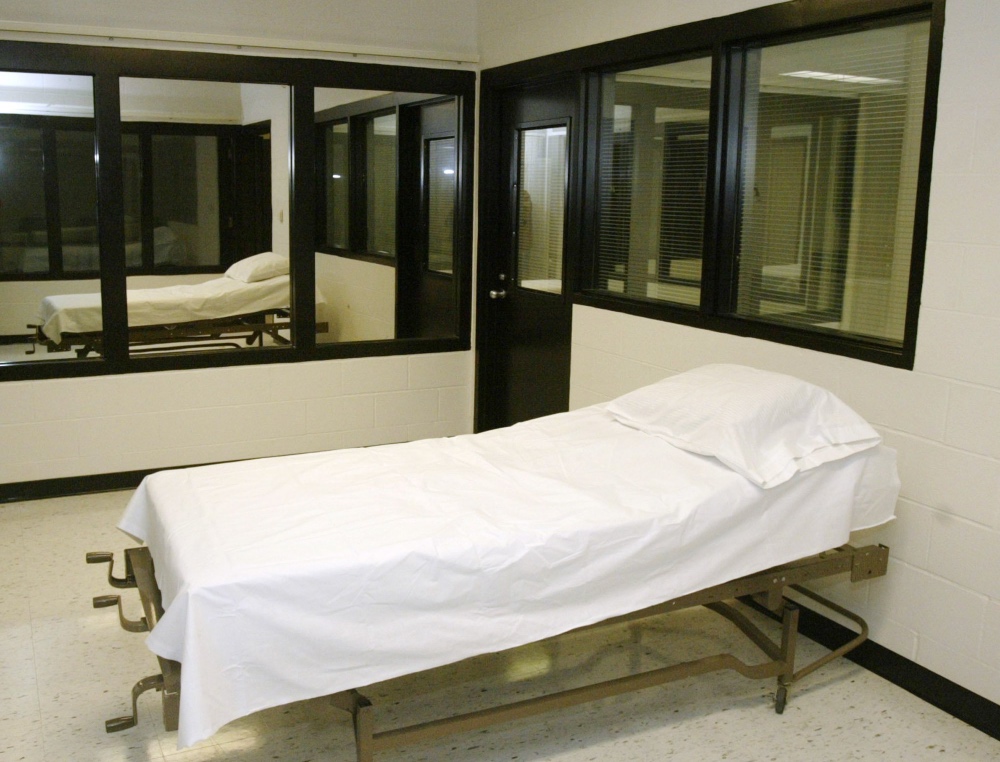
In an article first published on Religion News Service, anti-death penalty activist and author SHANE CLAIBORNE expresses hopes that executions are not something people want in a post-pandemic US…
Via RNS
Among the things disrupted by the pandemic is our government’s ability to carry out executions. Some of us might say it is one of the rare silver linings of this coronavirus nightmare.
It’s been over two months (75 days to be exact) since we’ve had an execution. There are only two other times since the turn of the century the state has gone that long without executing someone.
But last Tuesday (May 19), that pause came to an end when the state of Missouri executed Walter Barton for the murder of Gladys Kuehler.

In this 12th April, 2005, file photo is the death chamber at the Missouri Correctional Center in Bonne Terre, Missouri. PICTURE: AP Photo/James A Finley/ File photo.
Barton was convicted of killing his 81-year-old landlord, despite all kinds of inconsistencies in his case that should cause hesitation in even the most staunch supporter of the death penalty.
Barton’s execution is but the latest evidence of how irreparably broken our system of capital punishment is in America.
“Barton’s execution is but the latest evidence of how irreparably broken our system of capital punishment is in America.”
In the years since his arrest in 1991, Barton had five separate trials for his crime – nearly three decades of appeals, mistrials and overturned convictions. He had terribly inadequate counsel, including one attorney who has since been suspended from practicing law. The Missouri prosecutors in Barton’s case misconstrued and withheld evidence, something they had a pattern of doing. The same team of lawyers was responsible for the wrongful convictions of four other innocent men.
The victim had more than 50 stab wounds. Whoever did that would have been covered in blood, yet Barton was convicted based on a spot of blood on his shirt, which he has always said was from trying to console the grand-daughter of the victim, pulling her off the body, something confirmed by court testimony. In the words of one Missouri Supreme Court justice it has been “a trail of mishaps and misdeeds”.
It’s safe to say he was not guilty “beyond a reasonable doubt.” In fact, at least three of his jurors now say they would not have voted to convict him had they seen all the evidence. From the moment he was accused of the crime until he breathed his last breath, Barton maintained his innocence.
Nonetheless, confined to a wheelchair because of a severe neurological disorder due to a traumatic brain injury, Barton was executed at age 64. These were his last words, issued in a statement just before his execution: “I, Walter ‘Arkie’ Barton, am innocent, and they are executing an innocent man.”
For every nine executions carried out in the US, there has been one exoneration – one person later proved innocent after being wrongfully convicted and sentenced to death. That’s a terrible track record. Imagine if, for every 10 planes that took off, one of them crashed. That record raises the question of how much we trust our imperfect governmental systems with the irreversible power of life and death – one of the many reasons lawmakers on both sides of the aisle now oppose capital punishment and are pushing for criminal justice reform.
You cannot bring someone back from the dead.
But there is one other thing Barton’s execution reminds us of – the death penalty wouldn’t stand a chance in America if it were not for Christians. On Missouri Governor Michael Parson’s website, the last line of his bio reads: “Governor Parson has a passion for sports, agriculture, Christ, and people.”
Eighty-five per cent of executions happen in the Bible Belt, and nearly all the states that are actively executing have Christian governors, like Parson. It is a stark reminder that the death penalty has survived not in spite of Christians, but because of us.

In this 18th February, 2014, booking photo released by Missouri Department of Corrections, death row inmate Walter Barton is seen. PICTURE: Missouri Department of Corrections via AP.
If those of us who follow Jesus were to heed his words, “Blessed are the merciful, for they will be shown mercy,” we could end the death penalty overnight. But, as it is, on 19th May, Parson not only killed a man who was likely innocent. He also killed a brother in Christ. Barton was Catholic.
Parson’s decision to proceed with the execution during the pandemic also meant the people carrying it out were put in a position where not only did they have to take a man’s life, but they had to risk their own lives to do it. The prison checked their temperatures and required face masks before performing the execution.
It’s hard to miss the irony that just as our nation is talking constantly about how to save lives, the state of Missouri went out of its way to take someone’s life. In the words of my friend Krisanne Vaillancourt Murphy, the director of Catholic Mobilizing Network, a group working to end the death penalty and promote restorative justice: “Our nation has gone to great lengths to save lives and prevent unnecessary loss of life during the COVID-19 crisis. It’s tragically contradictory that Missouri put a man to death amidst the herculean efforts we see daily to protect life.”
During “normal” time and “normal” executions, there is usually a vigil held outside the prison, and sometimes a handful of counterprotesters in favour of the execution. But because of the pandemic, the vigil went virtual, hosted by Death Penalty Action and Missourians for Alternatives to the Death Penalty.
The 90-minute vigil that happened alongside his execution featured families of murder victims who are against the death penalty, legal experts, activists and clergy from across the globe. And, stunningly, the vigil during Barton’s execution turned out to be one of the most widely attended vigils in recent history, now viewed by tens of thousands of people from all over the world.
As I joined in, it occurred to me the pandemic may have the capacity to sensitize us in a new way to suffering and death. After many of history’s darkest moments, like apartheid and the Holocaust, scholars say people get “death fatigue” – and can rise from the trauma of death with a new sensitivity to life, and fresh empathy for those who suffer.
More than a dozen executions have been postponed over the last few weeks. In many cases, coronavirus is specifically cited as the cause for delay. So now with a backlog of executions, many of us are hoping a string of executions does not end up being a part of “getting back to business as usual.”
“More than a dozen executions have been postponed over the last few weeks. In many cases, coronavirus is specifically cited as the cause for delay. So now with a backlog of executions, many of us are hoping a string of executions does not end up being a part of ‘getting back to business as usual’.”
Many of us have heard a version of the heartfelt post-pandemic hope: “Let’s not get back to normal, because normal wasn’t working.” The pandemic has caused us to rethink a lot of things, and one can only hope that executing people is one of the things we don’t want to return to.
As my brother, Rev William Barber II, often says, “Too many people in power are way too comfortable with other people’s deaths.” Let us arise from the pandemic with a discomfort of death…even a holy anger about the lives that could have been saved.
Perhaps we can even hold out the hope that our fellow Christians in power will see that the whole point of the execution and resurrection of Jesus was to expose and subvert the powers of death.
Shane Claiborne is the author of Executing Grace: How the Death Penalty Killed Jesus and Why It’s Killing Us.





